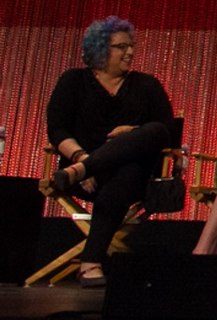A Quote by Lori Lightfoot
There's things that you can learn by being in the room with people that's different than talking to them over the phone or reading a policy paper.
Related Quotes
I think a comic looks better in the magazine. The colors are designed to be on paper, not illuminated on screen. I don't like the aspect of people reading it for free. When people get things for free, they tend to not take them as seriously. But I don't know. I'm sure 10 times more people are reading it online than in the actual paper.
Trump is an outsider; maybe you don't know. So he is sitting in a room: he is talking business, he is talking politics - in a private room, it's a different persona. When he's out on the stage, he is talking about the kinds of things he's talking about himself; he's projecting an image that's for that purpose.
So often we think, well, kids learn to read at school, I don't have to be responsible for that. But in fact they learn to love reading at home, and therefore it's really important that we as parents preserve the joy of reading by supporting them and reading things that speak to their hearts, books that they love.
And if you're a parent who thinks you're okay because your kid doesn't have a phone or iPod yet, and/or you've used all the parent controls to filter out explicit material, you're not okay. The filters are tissue paper and your kid without a phone is on a school bus or in a locker room or at a public park with phone-equipped kids every day. And they're like all kids in exploring - by whatever means available to them - exactly what their parents are treating as too embarrassing or taboo to talk about.
My standards are higher than they used to be, I think. They don't necessarily have to make sense, but I certainly work on them a lot harder now -- partly because I do them on the computer, and I print them out and fix them, and print them and fix them over and over again, whereas in the early days I used to just scratch down a few things on a piece of paper.


































